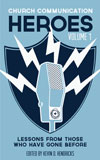“There is the Music of Heaven in all things and we have forgotten how to hear it until we sing.” –St. Hildegard von Bingen (1098-1179)
What does the life of a 12th century Benedictine nun have to do with 21st century church communications? Plenty, when you look at the life of Hildegard von Bingen, an abbess whose work was distinguished by gifts in multiple domains.
Hildegard von Bingen was a prophetic visionary and scientist, prolific writer and composer, dynamic community leader, gifted healer and teacher committed to communicating spiritual wisdom and hard truths about the medieval church. More than 800 years after her death, she was named a Doctor of the Church by the Vatican; only four women have ever received that level of recognition.
Instructive for us is how Hildegard understood the value of matching tools to audience and situation. During a time that we tend to think of as primitive, she moved effortlessly and skillfully from writing to speaking to song to communicate vital truths.
Her writing was so compelling that instead of dismissing her as just another hallucinatory nutcase, church authorities scrutinized and then validated her spiritual visions. Pope Eugenius III not only ordered their publication, but assigned a monk as her secretary. The awesomesauce of this is underscored by the fact that her writing includes hundreds of letters, many of which challenged church authorities for their ongoing mismanagement. Hildegard also took on the German Emperor Frederick Barbarossa and King Henry II of England.
She rocked the medieval world with her public sermons about church corruption and sexual misconduct, understanding that systemic change could not happen without truth-telling. Here’s Hildegard speaking truth to power in 1170: “O you priests. You have neglected your duties. …let us drive these adulterers and thieves from the Church, for they fester with every iniquity.”
Hildegard also used music to communicate beyond language. Her spirit-soaring music, which includes 77 hymns and canticles, as well as a play set to music, is usually characterized as “ethereal” because of the way harmonies are interwoven to evoke spiritual transcendence. This was such an essential language, that when church authorities decided to crack down, they did so by forbidding Hildegard and her nuns from chanting the Divine Office. For a while.
So what if your denomination doesn’t venerate saints? Consider honoring Hildegard von Bingen anyway by generating creative communications that jolt leadership and congregants alike into being and doing church with integrity.
- Watch a trailer for the 2010 German film Vision: From the Life of Hildegard von Bingen
- Hear Hildegard’s “Voice of the Living Light”
- Learn more about church communication heroes with our ebook, Church Communication Heroes Volume 1: Lessons From Those Who Have Gone Before.






Meredith Gould (@meredithgould)
April 28, 2014
Thanks, Kevin, for inviting my participation. I’m a long-time fan of Hildegard von Bingen but you helped me view her as a church communicator.
Kevin D. Hendricks
April 28, 2014
And aren’t we all church communicators?
;-)